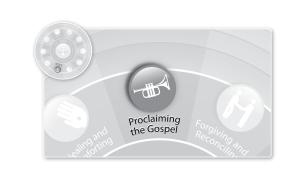 Since North Korean underground Christians aren’t able to gather in fives and tens on a regular basis–since, in other words, they must pass information to each other individually in very brief encounters together–then what do they pass on? What is the content of their proclamation?
Since North Korean underground Christians aren’t able to gather in fives and tens on a regular basis–since, in other words, they must pass information to each other individually in very brief encounters together–then what do they pass on? What is the content of their proclamation?
The three recurring elements that you’ll hear North Korean underground Christians share are the Apostle’s Creed, The Ten Commandments, and the Lord’s Prayer. In fact, they will usually build their personal worship times around these pillars, with the first addressing the question “What do we believe?”, the second addressing the question “How then do we act?”, and the third addressing the question, “How then do we talk to God?”
North Korean Christians would be absolutely astonished to hear that these three elements are largely absent from evangelical Christian worship services. (So would the Protestant Reformers, I suspect. The Heidelberg Catechism says, “What, then, must a Christian believe? All that is promised us in the gospel, a summary of which is taught us in the articles of the Apostles’ Creed.” And as Packer and Parrett note in their absolute must-read, Grounded in the Gospel, Luther’s catechisms, Calvin’s catechism, the Geneva Catechism, the Heidelberg Catechism, the Westminster catechisms, the Anglican catechism, and the Catholic catechism all note the centrality of the Ten Commandments, the Creed, and the Lord’s Prayer to the Christian life. How modern evangelicalism managed to expunge all three from worship–on principle, no less–is truly a mystery for the ages.)
In this series I’ve been excerpting comments from Mr. and Mrs. Bae, third generation underground Christians whose story I’ve written in a book scheduled to be released this fall. I think you’ll be as fascinated as I have been by Mrs. Bae’s description of how she and Mr. Bae and their children worshiped together once they all became Christians, following Mr. Bae’s release from prison on suspicion of Christian activity. Modern evangelical worship would do well to be so simple, so earnest, so deep, so robust:
From that time on, my family put up a wall against the world. We didn’t attend the mandatory birthday events where all North Koreans place flowers at the foot of Kim Il Sung’s statue. We sang hymns, not secular songs. Of course, we could not permit other people to hear our singing, so we would go sing quietly in the big fields whenever they were empty. Every evening, we locked the door and memorized the Lord’s Prayer and the Apostles’ Creed. In every area of our family life, we followed not Kim Il Sung’s teaching but God’s Ten Commandments. We didn’t know what kind of place a church would be or what a church service would be like. But every Sunday, we would gather and memorize the Apostles’ Creed, sing hymns, pray along with the Lord’s Prayer, and repent according to the Ten Commandments. If there was something I didn’t know about a tract, I’d ask my husband. He didn’t know all the answers, but he always did his best to recall what he had heard things from his grandfather and grandmother from his childhood. He himself had witnessed a lot of things, so he always tried to share with me in ways that were interesting.
We confessed if we had done anything wrong. My mother-in-law had taught me how to pray for repentance, how to pray for thanksgiving, and how to pray for the meal. The material from the church had also taught me how to pray. It was very simple, clear, and detailed. What we learned from them became our way of life. We did this every Sunday. We did not know how to close the worship, so we prayed the Lord’s Prayer together and sang a few hymns. One person led the singing, and the rest of the family followed.
Excerpted from These are the Generations by Eric Foley. Copyright © 2012 by .W Publishing. All rights reserved.










